North Korea On The Verge Of Collapse? Don’t Count On It
Predicting the end of the DPRK is a fool's errand.
Over at RealClearDefense, Christopher Lee sees signs that the regime in Pyongyang may not be long for this world:
Kim Jong Un is defined by many as an egotistical fanatic whose recklessness led to dreadful mistakes during his two year tenure. First, instead of implementing a sound plan to alleviate the mass hunger and poverty in his nation where the average annual income is $1,800, he continues to conduct costly missile research, development, and test launches. To support his weapons programs, Kim spends approximately $10 billion – about 25 percent of total GDP – on his military. The $3.2 billion spent on nuclear weapons and missile development over the years is equivalent to three years’ supply of food for North Korea’s citizens.
Second, on April 8, 2013, Kim broke his partnership with South Korea regarding their joint venture in the Kaesong Industrial Park. This action further severed ties between North and South Korea and cost North Korea 53,000 jobs and wage losses amounting to $245.7 million. South Korea paid workers’ salaries directly to the North Korean government, so this loss of revenue further bankrupted North Korea.
Third, and above all, Kim’s most flawed and dangerous decision was the recent purge and public pillory of Jang Song Thaek. This action not only destroyed the image of unity in his regime, but also inadvertently acknowledged the dissension and instability within the state-run government. It strained his nation’s alliance with its closest ally, China, who was working closely with Jang in an effort to convince a determinedly opposed Kim to adopt to a China-style economic reform.
Combined, these instances demonstrate a realistic probability that this authoritarian regime may potentially crumble in the near future.
A Korea specialist and renowned history professor at the University of Chicago, Bruce Cumings, has said Kim’s recent actions, in particular the purging of his uncle, undermined his legitimacy and stature as a global leader. Cumings outlined that “Kim Jong Un has managed to tarnish his own image, look like a modern Caligula and give the lie to 90 percent of the bombast emanating from Pyongyang.” While leaders in Pyongyang continue to insist that all is well domestically, “from the stand point of the top leadership [purging Jang] was a politically stupid, self-defeating move,” Cumings added. In short, the DPRK openly admitted that someone tried to take out the “Great Successor.” And not just anyone, but the man closest to the Kim family regime.
All of these are good observation, but people have been predicting the collapse of North Korea for some time now and the Kim’s have managed to hold on with power notwithstanding that they have a nation that is barely economically viable. In no small part this seems to be due to the fact that, for 70 years now, North Koreans have been propagandized, terrorized, and punished to the point where the idea of a popular uprising against the Kim regime seems nearly unthinkable. As far as we know, for example, the collapse of the Soviet Union and its empire from 1989-1991 sparked no protests of any kind among the North Korean people even though it seemed at the time as though it had lit an unquenchable fire. Additionally, the Kims have been very effective at creating absolutely loyalty among the military and the political elite. While Lee points to last year’s execution of Jang Song Thaek as a sign of weakness, for example, it’s just as easy to see it as another sign that crossing the leader, whomever it happens to be at a given time, is a fatal mistake. We may never know exactly what it was that Thaek did or did or did not do that warranted his execution — as I posited at the time it may have been nothing more than Kim deciding he didn’t need his uncle’s “protection” any more and that eliminating a potential threat was in his interests — but assuming that it is a sign that the end of the Kim regime is near seem to me to be quite mistaken.
What’s striking about Lee’s piece, though, isn’t so much what it does say as what it doesn’t. He makes almost no mention of the role that China plays in the future of the Kim regime and the Korean Peninsula. At this point, the only reason that the DPRK survives in its current form is because the Chinese wish it to for their own interests. These interests include their reluctance to see a united Korea allied with the West on their borders, the disruption that a swarm of refuges would cause, and the potential inspiration that a popular uprising in North Korea would be to reticent movements for greater freedom in China itself. When China decides that it is no longer in their interests to prop up the Kim regime, then that will be the end. Until that point, there’s always the possibility that internal events could lead to a chaotic collapse in Pyongyang, which itself could cause problems for both China and South Korea, but if that happens it will likely be something that nobody saw coming.
H/T: Stephen Green
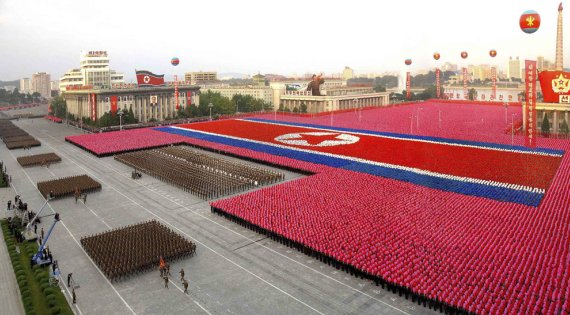

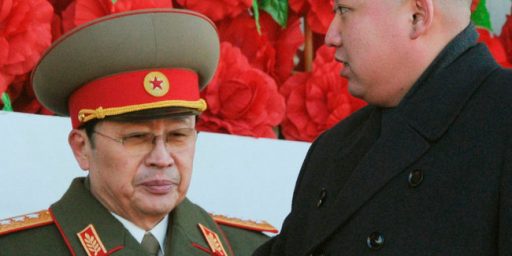
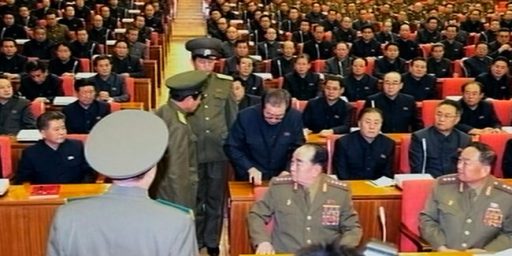
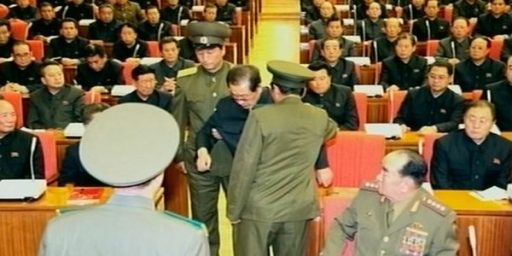
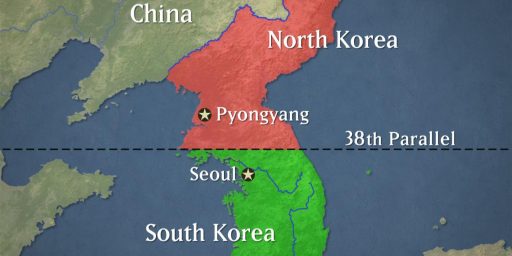
Good analysis Doug, I think your objections are spot on.. My only question has always been is Kim Jong Un really in charge or is he just a figure head? If China thought the country was about to collapse I suspect they would just move in and annex it and I doubt there would be a lot of objection from the international community with the possible exception of South Korea.
There’s only one factor that’s indispensable to the North Korean regime’s survival: China’s continued support. If the Chinese leadership decides that NK is more trouble than its worth, the regime will be gone.
But not until then.
Meantime the IAEA says that other member of the Acis of Evil, Iran, is behaving itself on nukes.
http://m.washingtonpost.com/world/middle_east/un-iran-cuts-stock-closest-to-nuke-arms-grade/2014/04/17/168b63f6-c612-11e3-b708-471bae3cb10c_story.html
Nice article. China will always maintain control and influence over North Korea. They have absolutely no motivation for regime change. Pyongyang is too valuable a proxy for China to use against the West. The only scenario that would result in China abandoning North Korea is if the US agreed to give up protection of Taiwan in return. That’s a Faustian deal that will likely never happen.
I concur with the “it’s only gonna stay propped up as long as the Chinese want it to.”
I don’t know about outright annexation, though. They’d probably take it in as an “independent protectorate” and then gradually move native Han Chinese in, the way they’ve been doing with Tibet.
I think most of the world is just sick and tired of North Korea and would be perfectly happy if the Chinese took them over officially. Some tut-tutting, but nothing more.
@grumpy realist: I would agree except they have to some how lop off the heads of the tyrannical and corrupt government and military officials. Nothing will change as long as they are in charge.
@Ron Beasley: @grumpy realist: The argument of China “snatching up” (as people put it here) NK is a common scenario in the South as well. The best argument against it happening is–first, it hasn’t happened already (either as a protectorate or a wholesale takeover), and second, China annexing one, arguably, of the poorest nations in the world (maybe in history) is a precarious decision to make in a country already split between coastal Chinese–who tend to be very rich–and interior Chinese–who tend to be very poor. Diluting an already strained social nexus to annex NK is problematical at best,.
I doubt this terrible government collapses soon as well. This government still commands great loyalty from the people by means of cradle to grave brainwashing and a personality cult government that substitutes it’s own leaders as religious figures with superhuman powers. Humans are very resistant to tossing off bad religious values, no matter how much harm it causes them or how irrational and silly the beliefs may be.
@Paul Hooson: I think what you say is largely true. I still think that Kim Jong Un is a figure head – the mystical high priest, and I have to wonder who is really in charge.
@Ron Beasley:
Very possibly a praetorian state. His uncle’s death might have been “Him or the both of you, Porky.” Went from a favorite to traitor in snap.
I disagree. The Kim family is firmly in charge of the leadership. Kim Jong Il did decide to give the Army the most favored status in his Military First edict, giving the Korean People’s Army (KPA) the top resource priority. Some in the ruling Korean Worker’s Party (KWP) didn’t appreciate that, of course. This is typical of the Stalinist playing one side against the other balance of power that the Kims were experts at. KJU’s uncle made the fatal mistake of openly showing his condescension towards his erstwhile protege, and pursuing a trade relationship with China that powerful cliques in both the KPA and KWP did not approve of. I have no doubt KJU is firmly in charge at this point.
@DC Loser:
Cite?
Multiple reporting. Try Andrei lankov’s pieces on NKnews.org